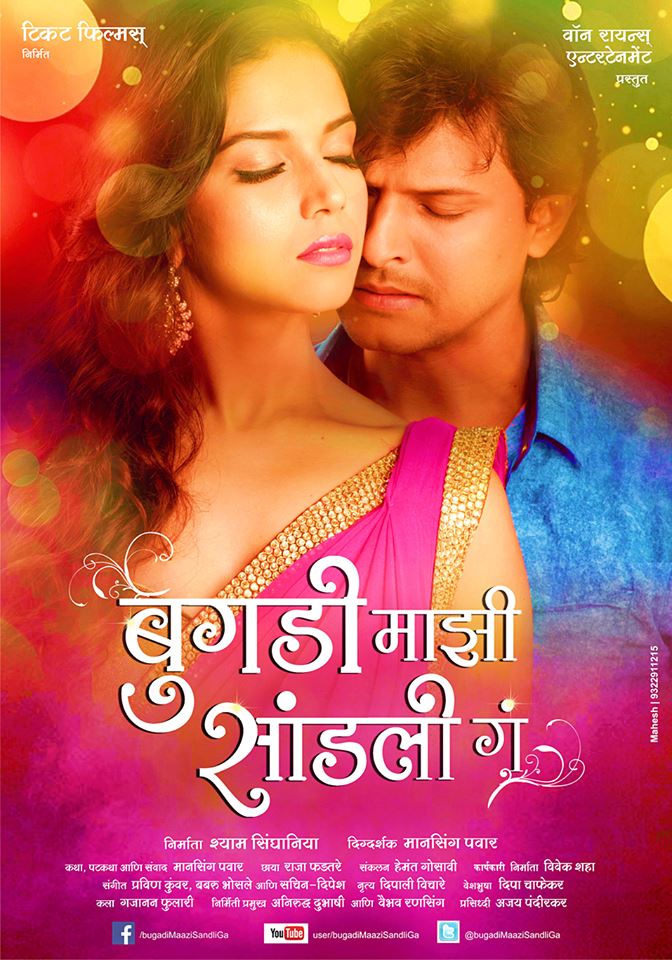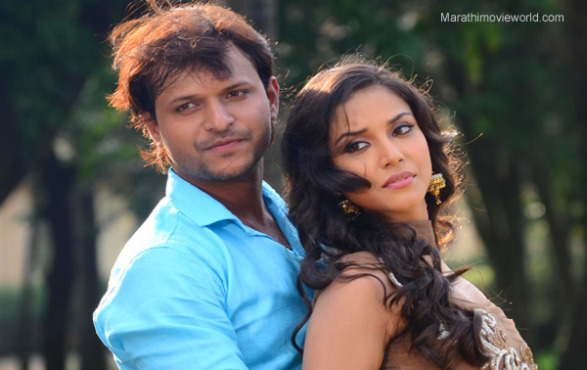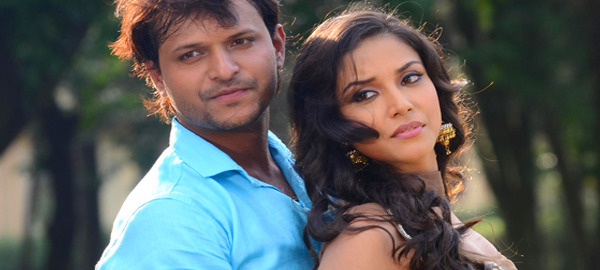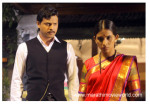 Rating: ★★ ½
Genres: Romantic Censor: U/A Duration: 125 Min. Studio/presenter: Tikit Films Producer: Shyam Singhaniya Director: Mansing Pawar Writer: Mansing Pawar Lyrics: Mansing Pawar, Baba Chavan, Rajesh Bamugade, Sanjali Rode Music: Pravin Kunwar, Sachin-Dipesh, Prabhu Bhosale Cinematographer (DOP): Raja Phadtare Cast: Mansi Moghe, Kashyap Parulekar, Mohan Joshi, Dipa Chafekar, Ramesh Bhatkar, Ila Bhate, Jagannath Nivangune, Megha Ghadge, Pandurang Kulkarni, VIjaya Palav, Gautami Kalbaag, Prachi Cheulkar, SaniBhushan Mungekar, Jitendra wankhede, Amar Pawar, Pradeep Patil, Manoj Jadhav, Ravindra Tanvar, Sachin Navre, Pavanraj Ahivale, Mansing Pawar Movie Review by: Ulhas Shirke |
Every filmmaker feels that whatever he offers is something remarkable. And, there is nothing wrong in expecting success in return. But today, Marathi films are showing a change, with new subjects dealt in films. Therefore, if the script of the film is outdated and is not able to convince the audience; then the result is known to all. Latest released Marathi film ‘Bugadi Majhi Sandali Ga‘ goes with the formula, adopted in films of 60s and 70s.

Producer Shyam Singhania and director Mansingh Pawar signed Miss India Universe Beauty queen Manasi Moghe, to play the lead role of a beautiful dancing actress and focused their attention on ‘Lavani’ the traditional dance form of Maharashtra, as the base of the film. In order to make it more musical, they engaged three different music directors. But, as they say, ‘Too many cooks spoil the broth ‘. Barring two songs, the other seven songs in this film, have failed to appeal. And, that turned out to be the biggest drawback of the film. Even the screenplay of this film, with limited content, failed to generate much interest, due to predictable happenings, except for the climax. But, that too had left a hint, in the initial scene of the film. So, don’t miss the beginning.
The story of this film revolves around Shubhangi (Manasi Moghe) who is an orphan, and brought up by a Tamasha dancer Chandraprabha Sanglikar( Deepa Chafekar). Chandraprabha who is in live-in-relationship with Raosaheb, since her younger days, lives in Raosaheb Shinde’s big house, 40 kms away from Kolhapur city. Indrajeet, the only son of Appasaheb Mohite and Padmaja Mohite(Ramesh Bhatkar & Ila Bhate) who are rich and run a trust in Kolhapur. He returns from abroad, after studying music and wants to know more about ‘Lavani’ the traditional Indian dance-music form. That’s how he comes across Shubhangi and falls in love with her. She too gives her heart to Indrajeet.
The trouble begins, when Appasaheb comes to know about their relationship. In the meanwhile, Raosaheb also returns after six years. Watching Shubhangi’s beauty, Raosaheb also make his advances towards her, but Chandraprabha warns him. Everything goes on, as predicted, except for the tragic end. Actually, the film fails to capture the attention of the audience in pre interval stage. In every intense love story, there is strong opposition from other characters. That does not happen in this film. The only negative character is seen playing his cruel act towards the end of the film. Even the opposition from Indrajeet’s parents and Chadraprabha is not very convincing.
There are many such incidences in the film, which fail to convince. As far as the performances are concerned, Manasi Moghe makes a sincere attempt on her debut. She looks beautiful in every scene. But, the director and the choreographer should have paid more attention on her body language & visual expressions in close up. Even, not much attention has been paid on her accent, which should have been in typical Kolhapuri style. Kashyap Parulekar has done well, in the role of Indrajeet. But, his real potential hasn’t been exploited by the director, except for the last scene.
A lot of importance has been given to the character of Chandraprabha, so much so that she is also given scope to perform a baithak Lavani, with a full song picturised on her. Ila Bhate finds her share to prove her acting skills, in two important scenes in the post interval session. In comparison Ramesh Bhatkar is just namesake father in the film, with not much scope for an actor of his caliber. Mohan Joshi plays the negative character in his own style, in the concluding part of the film. ‘Lakshya’ serial fame Jagannath Nivangune, has also been wasted in this film. Other character artistes offer the required support. Good cinematography by Raja Fadtare is the plus point of this film. He has picturised one outdoor song very well.
‘Bugadi Majhi Sandali Ga‘ may not appeal the Mumbai audience much; but might invite some response from places like Kolhapur, Nagpur and other small cities in Western Maharashtra, provided it has found theatres at such places.




